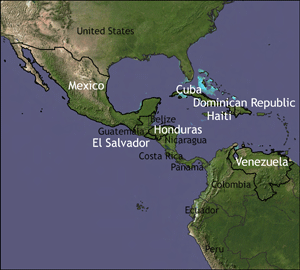The Central American and Caribbean region, sometimes also referred to as Middle America, coincides roughly with the area known in pre-Columbian archaeology as Mesoamerica. It comprises some 25 countries with coastlines on the Caribbean Sea. These include the large mainland countries of Mexico in the north and Columbia and Venezuela in the south; the islands of the Caribbean; and the Central American nations of the isthmus that links North and South America and separates the Caribbean from the Pacific Ocean. The total population of the region is estimated at approximately 240 million inhabitants.

An important feature of the Central American and Caribbean region is its immense biodiversity, characterised not only by a high number of species, but also by an enormous variety of ecosystems. Some four-fifths of mainland Central America is hilly or mountainous territory rising up from the lowlands of the coastal region along the Caribbean Sea. The climate is essentially tropical, with temperatures varying widely, depending on differences in altitude and proximity to the sea. The region is geologically unstable with high volcanic activity and frequent earthquakes.
The greater part of the mainland population has traditionally preferred to occupy the tierra templada (“temperate land”) of the Pacific highlands, where lower temperatures provide some protection from the diseases common in the tierra caliente (“hot land”) of the low-lying coast. This tendency was reinforced by the immigration of large population groups from Europe since the arrival of Spanish explorers at the end of the 15th century.
Spanish and Portuguese domination of the region continued well into the 19th century and Spanish remains the predominant language in most countries. On islands and territories taken by other colonial powers, English, French or Dutch became the official language. An estimated 60 percent of Central America's population is of mixed European and American Indian descent, while some 20 percent are thought to be of “pure” Amerindian origin. The ethnic mixture was also influenced by the importation of slaves from West Africa by the colonial powers.
Although most countries in Central America and the Caribbean achieved political independence over the course of the 19th century, the military and economic power of the United States has since become the dominant political factor in the region. With the opening of the Panama Canal in 1914 it became the main access route to the Pacific for shipping from Europe and the eastern United States. This increased strategic importance made the region the focus of intense geopolitical struggles throughout the 20th century.
Challenges to sustainable development in the region are typical of those faced in many parts of the developing world in the age of globalisation: unbalanced economic growth with increasing income disparities; unplanned urbanisation and industrialisation; marginalisation of the poor; rapid population growth and the resultant environmental pressures and conflicts over natural resources. A particular problem for the Central American and Caribbean region is its economic dependence on the United States: income from tourism and from remittances from legal and illegal migrants to the US is crucial to most of the economies in the region.
NCCR North-South activities in the Central American and Caribbean Region are supervised by the Regional Coordination Office at the
Facultad Latinoamérica de Ciencias Sociales, in San José, Costa Rica. Research in the region focuses on issues such as the effects of urbanisation, natural resource governance and livelihood strategies, health and sanitation services for vulnerable groups and the role of institutions – including the private sector – in peace promotion.
Regional Coordination
Central America Regional Office
Marian Perez (Regional Coordinator)
Facultad Latinoamericana en Ciencias Sociales (FLACSO-CR)
Urbanización El Prado, Curridabat,
1000 San José, Costa Rica
Tel. (506) 224 80 59 ext 122 (office); (506) 224-8059 (secretariat)
Fax: (506) 253 4289.
E-Mail: mperez@flacso.or.cr
Related content
Publications